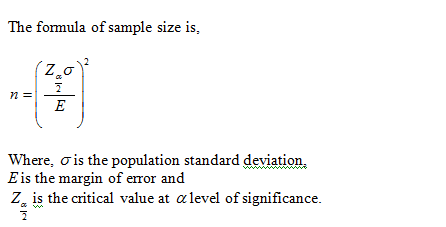Assume that the sample is a simple random sample obtained from a normally distributed population of IQ scores of statistics professors. Use the table below to find the minimum sample size needed to be 95% confident that the sample standard deviation s is within 40% of sigma. Is this sample size practical? a. The minimum sample size needed is
Assume that the sample is a simple random sample obtained from a normally distributed population of IQ scores of statistics professors. Use the table below to find the minimum sample size needed to be 95% confident that the sample standard deviation s is within 40% of sigma. Is this sample size practical? a. The minimum sample size needed is
MATLAB: An Introduction with Applications
6th Edition
ISBN:9781119256830
Author:Amos Gilat
Publisher:Amos Gilat
Chapter1: Starting With Matlab
Section: Chapter Questions
Problem 1P
Related questions
Question
Assume that the sample is a simple random sample obtained from a
a. The minimum sample size needed is

Transcribed Image Text:To be 95% confident that \( s \) is within a certain percentage of the value of \( \sigma \), the sample size \( n \) should be at least:
- For 1%: \( n = 19,205 \)
- For 5%: \( n = 768 \)
- For 10%: \( n = 192 \)
- For 20%: \( n = 48 \)
- For 30%: \( n = 21 \)
- For 40%: \( n = 12 \)
- For 50%: \( n = 8 \)
To be 99% confident that \( s \) is within a certain percentage of the value of \( \sigma \), the sample size \( n \) should be at least:
- For 1%: \( n = 33,218 \)
- For 5%: \( n = 1,336 \)
- For 10%: \( n = 336 \)
- For 20%: \( n = 85 \)
- For 30%: \( n = 38 \)
- For 40%: \( n = 22 \)
- For 50%: \( n = 14 \)
Expert Solution
Step 1

Step by step
Solved in 2 steps with 1 images

Similar questions
Recommended textbooks for you

MATLAB: An Introduction with Applications
Statistics
ISBN:
9781119256830
Author:
Amos Gilat
Publisher:
John Wiley & Sons Inc

Probability and Statistics for Engineering and th…
Statistics
ISBN:
9781305251809
Author:
Jay L. Devore
Publisher:
Cengage Learning

Statistics for The Behavioral Sciences (MindTap C…
Statistics
ISBN:
9781305504912
Author:
Frederick J Gravetter, Larry B. Wallnau
Publisher:
Cengage Learning

MATLAB: An Introduction with Applications
Statistics
ISBN:
9781119256830
Author:
Amos Gilat
Publisher:
John Wiley & Sons Inc

Probability and Statistics for Engineering and th…
Statistics
ISBN:
9781305251809
Author:
Jay L. Devore
Publisher:
Cengage Learning

Statistics for The Behavioral Sciences (MindTap C…
Statistics
ISBN:
9781305504912
Author:
Frederick J Gravetter, Larry B. Wallnau
Publisher:
Cengage Learning

Elementary Statistics: Picturing the World (7th E…
Statistics
ISBN:
9780134683416
Author:
Ron Larson, Betsy Farber
Publisher:
PEARSON

The Basic Practice of Statistics
Statistics
ISBN:
9781319042578
Author:
David S. Moore, William I. Notz, Michael A. Fligner
Publisher:
W. H. Freeman

Introduction to the Practice of Statistics
Statistics
ISBN:
9781319013387
Author:
David S. Moore, George P. McCabe, Bruce A. Craig
Publisher:
W. H. Freeman